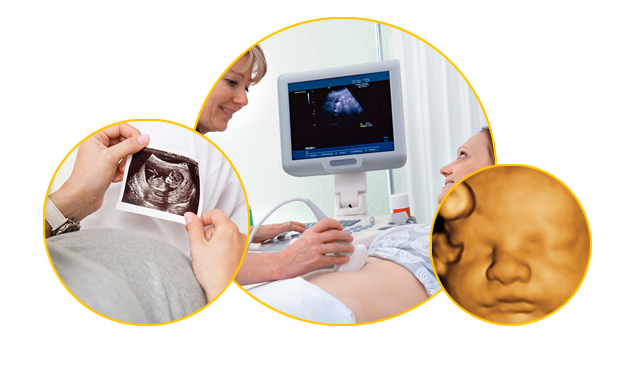Pregnancy Scanning
Transvaginal Scan (TVS)

At Mediserv Diagnostics, we're dedicated to helping new, expectant and "actively trying" parents to find the information, support and reassurance they need. We want to be your most trusted parenting resource - that's why we offer diagnostic ultrasound imaging, 3D/4D Baby Scanning as well as early pregnancy, reassurance and obstetric scanning examinations.
Abdominal scan

After 10 weeks and for the rest of your pregnancy, you will have an abdominal scan. However, if the doctor needs to check your cervix (mouth of uterus and birth canal), a transvaginal scan may be done as it is more accurate. During an abdominal scan, the doctor will put some (usually very cold) gel on your tummy. She will then move a small hand-held probe or transducer over your skin to get views of your baby.
Anomaly Scan

The anomaly or 20 week scan is used to check on your baby's development, as well as check where your placenta is lying in your uterus. The scan does not always happen exactly at 20 weeks, so you could expect an appointment around the 18 to 20 week mark. This scan is similar to your previous dating scan but the sonographer will point out your baby's heartbeat and parts of their body, such as face and hands, before looking at your baby in detail.
Dating Scan

Your dating scan or 12 weeks scan is your first ultrasound scan, and is used to predict the due date of your baby as well as help to ensure the foetus is developing normally and determine exactly how many babies you have in there!
3D/4D Scan

A 3D ultrasound scan provides a much more detailed picture than a traditional 2D ultrasound scan. The 3D ultrasound image can provide more accurate measurements, and both doctors and parents can better appreciate a certain abnormality or the absence of a certain abnormality with a 3D scan. 3D ultrasound pregnancy scans also show how the baby “behaves” in the womb and is able to monitor foetal movement.
Nuchal Scan

You may be asked to attend for a nuchal scan some time between weeks 11 and 13 of pregnancy. A nuchal scan, or nuchal translucency scan, is an ultrasound scan that enables your obstetrician or sonographer to take a measurement of a particular skin fold at the back of your baby's neck. In babies with Down's syndrome, this fold of skin is thicker than in babies without the syndrome. this is due to the amount of fluid lying under the skin (the nuchal thickness). This measurement is used, along with the results of blood tests, to calculate whether a woman is offered an invasive test, such as an amniocentesis.